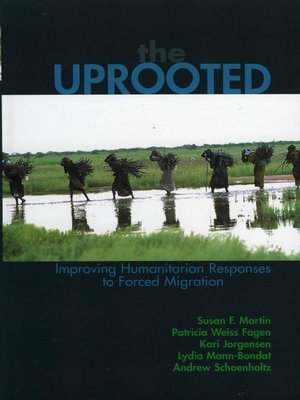The Uprooted
ebook ∣ Improving Humanitarian Responses to Forced Migration · Program in Migration and Refugee Studies
By Susan F. Martin

Sign up to save your library
With an OverDrive account, you can save your favorite libraries for at-a-glance information about availability. Find out more about OverDrive accounts.
Find this title in Libby, the library reading app by OverDrive.



Search for a digital library with this title
Title found at these libraries:
| Library Name | Distance |
|---|---|
| Loading... |
By conservative estimates about 50 million migrants are currently living outside of their home communities, forced to flee to obtain some measure of safety and security. In addition to persecution, human rights violations, repression, conflict, and natural and human-made disasters, current causes of forced migration include environmental and development-induced factors. Today's migrants include the internally displaced, a category that has only recently entered the international lexicon. But the legal and institutional system created in the aftermath of World War II to address refugee movements is now proving inadequate to provide appropriate assistance and protection to the full range of forced migrants needing attention today.
The Uprooted is the first volume to methodically examine the progress and persistent shortcomings of the current humanitarian regime. The authors, all experts in the field of forced migration, describe the organizational, political, and conceptual shortcomings that are creating the gaps and inefficiencies of international and national agencies to reach entire categories of forced migrants. They make policy-based recommendations to improve international, regional, national, and local responses in areas including organization, security, funding, and durability of response. For all those working on behalf of the world's forced migrants, The Uprooted serves as a call to arms, emphasizing the urgent need to develop more comprehensive and cohesive strategies to address forced migration in its complexity.
The Uprooted is the first volume to methodically examine the progress and persistent shortcomings of the current humanitarian regime. The authors, all experts in the field of forced migration, describe the organizational, political, and conceptual shortcomings that are creating the gaps and inefficiencies of international and national agencies to reach entire categories of forced migrants. They make policy-based recommendations to improve international, regional, national, and local responses in areas including organization, security, funding, and durability of response. For all those working on behalf of the world's forced migrants, The Uprooted serves as a call to arms, emphasizing the urgent need to develop more comprehensive and cohesive strategies to address forced migration in its complexity.







